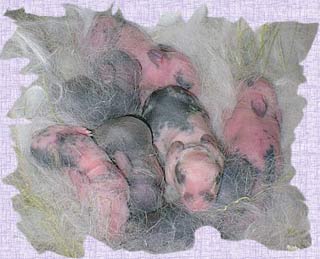The role of pheromone in developing the ability to recognize smells in newborn mammals
During the study of the ability to recognize the new smell of newborn rabbits, scientists discovered that the pheromone found in human milk acts as a chemical stimulant that helps baby rabbits. develop the ability to relate the odors around with a quick feeding by the mother.
These findings help us better understand the function of pheromones and better understand how the learning took place in the early days of mammal life.

New born rabbits (Photo: www.oeni.com)
These findings were published in the October 10 issue of the journal Current Biology published by Cell Press and a group consisting of Gérard Coureaud, Anne-Sophie Moncomble and colleagues from the European Sensory Science Center in Dijon (France) - the center is supported by the National Science Research Center and the University of Bourgogne with Inra. Benoist Schaal, who co-conducted the study, is also the director of the European Sensory Science Center.
Newborn mammals mainly live on breast milk and they have very specific action sequences when looking for milk. Milk-seeking behavior quickly becomes more and more smooth, demonstrating that they are good learners.
Previous studies of this early learning were done on a European rabbit (scientific name Oryctolagus cuniculus) that proved that newborn rabbits have very typical food-seeking movements when respond to olfactory signals. These signals contain pheromones secreted from the mother's gland.
The ability of newborns to rapidly develop milk-finding skills includes learning to recognize that " new " smells such as odors from the womb or the smell of milk are related to food.
In this new study, scientists have " investigated " whether the mammary pheromone plays a role in helping newborn rabbits be able to relate odors to milk sources to feed them.
First, the scientists provided pheromones for new born rabbits with a different "neutral" smell and then checked to see if there was only a neutral smell, then the smell would then help create onions. whether or not to find specific food in baby rabbits. In this way, scientists have shown that pheromones are really effective in developing the ability of newborn babies to learn the meaning of new smells.
Scientists have shown that learning the meaning of new smells through pheromone action is effective from the moment the mammals are born and able to accelerate the process of learning the odors another, the odors they may encounter later.
Supposedly capable of helping newborn mammals develop the learning of olfactory cues, the breast pheromone acts as a sort of organizational signal, a signal that promotes brain ability. in linking new odors to existing milk sources.
This inevitably facilitates the formation of an essential skill: the ability to quickly develop mammalian instincts of breastfeeding in the first days of life.
Scientists conducting this study include: Gérard Coureaud, Anne-Sophie Moncomble, Delphine Montigny, Maeva Dewas, and Benoist Schaal of the European Sensory Science Center (CNRS / University of Bourgogne / Inra) in Dijon, France along with Guy Perrier of the National High School of Agronomic Teaching Dijon (France).
The Center for National Scientific Research, Ministry of Research and Technology (Incentive Concerted Action Neuroscience), District Bourgogne and Fyssen Foundation (Paris) funded this study.
- The nose smelled 1,000 billion different smells
- Baby rabbits learn about smell thanks to pheromone in breast milk
- You really have the ability to smell others' sick smells
- Crow can recognize human voices
- The relationship between sex and age in worms
- Can animals recognize them when looking at mirrors?
- Young mice can regenerate their heart after injury
- Loving way of animals
- Dogs know face recognition
- The incredible abilities of babies
- Father and mother are well known for their crying children
- Archaeological discovery of venomous mammals on hind legs
 Animal 'suffering' after hibernation
Animal 'suffering' after hibernation Why do goats climb well?
Why do goats climb well? Scientists were surprised to see chimpanzees eating turtles
Scientists were surprised to see chimpanzees eating turtles Giant catfish died deadly due to drought in Thailand
Giant catfish died deadly due to drought in Thailand